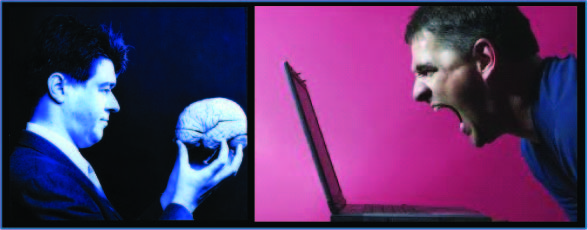Introduction to Neuroimaging Methods
Lectures and Workshops
Lectures and workshops will take place on Wednesdays, 14.30, either in the CBU West Wing Seminar Room or Lecture Theatre (see below).
Some of these events are synchronised with Rik Henson's SPM lectures (http://www.talks.cam.ac.uk/show/index/12102).
Look here for other training opportunities in and around Cambridge.
Please contact OlafHauk with questions and feedback.
|
Date |
Time |
Title |
Presenter(s) |
Type |
Location |
Approx. Duration |
Comments |
Jan 15 |
14.30 |
Olaf Hauk |
Lecture |
LT |
45 min |
Basic physical concepts needed for the interpretation of EEG/MEG and fMRI data. Electric potential, fields, atoms and spins... |
|
Jan 22 |
14.30 |
Olaf Hauk |
Lecture |
LT |
45 min |
Using two recent experiments as examples, I will go through the most common aspects of EEG/MEG analysis, from data averaging over time-frequency analysis to source estimation |
|
Jan 29 |
14.30 |
Olaf Hauk |
Lecture |
LT |
45 min |
Basic concepts of source estimation/localisation or the "Inverse Problem" of EEG/MEG; forward and inverse models; combining sensor types; methods comparisons; spatial resolution |
|
Feb 5 |
14.30 |
Marta Correia |
Lecture |
LT |
45 min |
This talk will cover the basic principles of MRI physics for beginners, including nuclear spins and net magnetization, excitation and relaxation mechanisms, slice selective gradients, frequency and phase encoding, image formation and k-space. |
|
Feb 12 |
14.30 |
MRI Physics 2: The BOLD Signal and Common Artefacts |
Marta Correia, Tibor Auer |
Lecture |
WWSR |
1.5 h |
This talk is aimed at fMRI beginners and will be divided into two parts. Firstly, I will talk about the biophysics of fMRI and the basic mechanism behind BOLD contrast. In the second half, I will discuss common image artefacts and ways to work around them. |
Feb 19 |
14.30 |
fMRI Analysis 1: Introduction to aa and fMRI Pre-Processing |
Tibor Auer, Marta Correia |
Lecture + Workshop |
WWSR |
3 h |
This workshop is divided into three parts. Firstly, I will briefly describe the CBSU working environment (data and software used during the workshop) and how to access it. Then I will introduce aa from practical perspective especially highlighting the diagnostic features. Finally, each preprocessing step will be demonstrated using an example dataset along with the discussion of the theoretical background. |
Feb 26 |
14.30 |
fMRI Analysis 2: General Linear Model, Study Design and Efficiency |
Tibor Auer, Marta Correia |
Lecture + Workshop |
WWSR |
3 h |
This workshop covers the basic principles of single-subject design focusing on how it is implemented in SPM (and aa). The main topics are: GLM, contrasts, statistical inference and the issue of multiple comparison. |
Mar 5 |
14.30 |
fMRI Analysis 3: Group Statistics |
Tibor Auer, Marta Correia |
Lecture + Workshop |
WWSR |
3 h |
After a short recap of then GLM, which is the basis of the group analysis, too, we will review some example designs. The main topics are: fixed and random effects, repeated measures, ANOVA, ANCOVA. |
Mar 12 |
14.30 |
EEG/MEG 3: EEG/MEG Analysis in SPM |
Jason Taylor, Rik Henson |
Lecture + Workshop |
WWSR |
3 h |
Note: SPM lecture next day |
Mar 19 |
14.30 |
(f)MRI Analysis 4: Diffusion MRI |
Marta Correia, Tibor Auer |
Lecture + Workshop |
WWSR |
3 h |
|
Mar 26 |
14.30 |
fMRI Analysis 5: Multivariate fMRI Analysis |
Marieke Mur |
Lecture + Workshop |
WWSR |
3 h |
|
Apr 2 |
14.30 |
TMS and tDCS |
Michael Ewbank |
Lecture |
LT |
45 min |
|
|
|
|
|
|
|
|
|
May 15/16 (Thu/Fri) |
TBA |
EEG/MEG Analysis in MNE-Python |
Alexandre Gramfort, Denis Engemann, et al. |
Workshop |
WWSR |
2-day |
Details to be confirmed |

